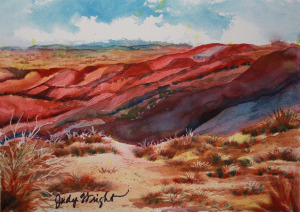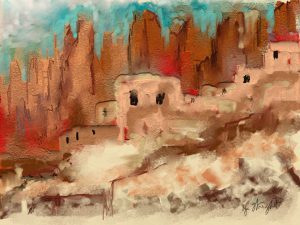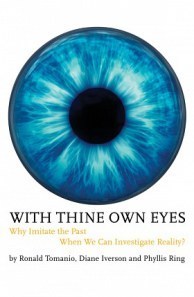Building the good

“Painted Desert” by Judy Hughey Wright
Dwelling on imperfections, berating myself or others for them, saps time, energy, and attention (those resources over which I have choice). It offers them to what is counterproductive, even destructive — when I have been invited, instead, toward the building of the good.
“Their whole energy is directed towards the building of the good, a good which has such a positive strength that in the face of it the multitude of evils – which are in essence negative – will fade away and be no more.” ~ From a letter from the Universal House of Justice, 1974
The same letter noted, “… demolishing one by one the evils in the world is a vain waste of time and effort.” When asked about evil, ‘Abdu’l-Bahá offered this definition: Evil is imperfection.

“Pueblo” by Judy Hughey Wright
When I choose to participate in the building of the good, I become aware of how much preoccupation with negativity can surround our lives, fill our thoughts, and absorb our personal resources. I can also come to see how this is the debilitating presence of blind imitation of the past, including the kind of thinking that was born in earlier, fearful experiences and has led to attitudes, behaviors, assumptions, and beliefs that have no basis in reality — nor, indeed, anywhere near it.
My encounter with the contrast of imperfection can urge me toward accepting that there is much I don’t know, or can’t change, yet I can always discover the limitless possibilities of love in that more-productive kind of response that I’ve been created and equipped to make.
 Rather than exercising my survival-driven instinctual reaction to fight imperfection, or try to escape it, there’s a response better-aligned with the purpose for which I’ve been created. It will contribute toward building what “has such a positive strength that in the face of it the multitude of evils – which are in essence negative – will fade away and be no more”.
Rather than exercising my survival-driven instinctual reaction to fight imperfection, or try to escape it, there’s a response better-aligned with the purpose for which I’ve been created. It will contribute toward building what “has such a positive strength that in the face of it the multitude of evils – which are in essence negative – will fade away and be no more”.
I open, today, to the possibilities of that response.
Adapted from With Thine Own Eyes: Why Imitate the Past When We Can Investigate Reality?





